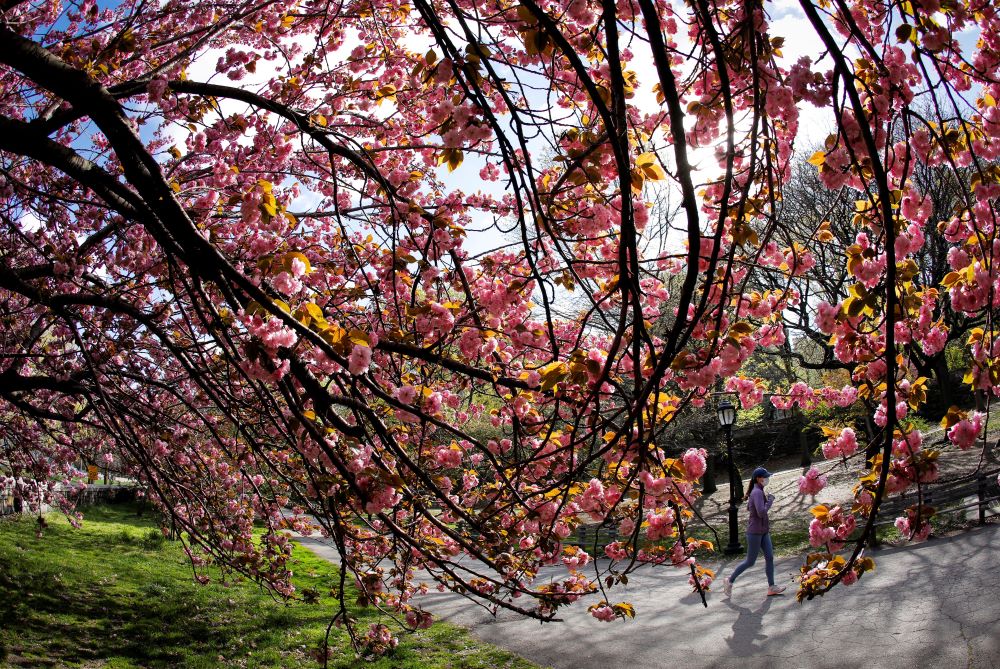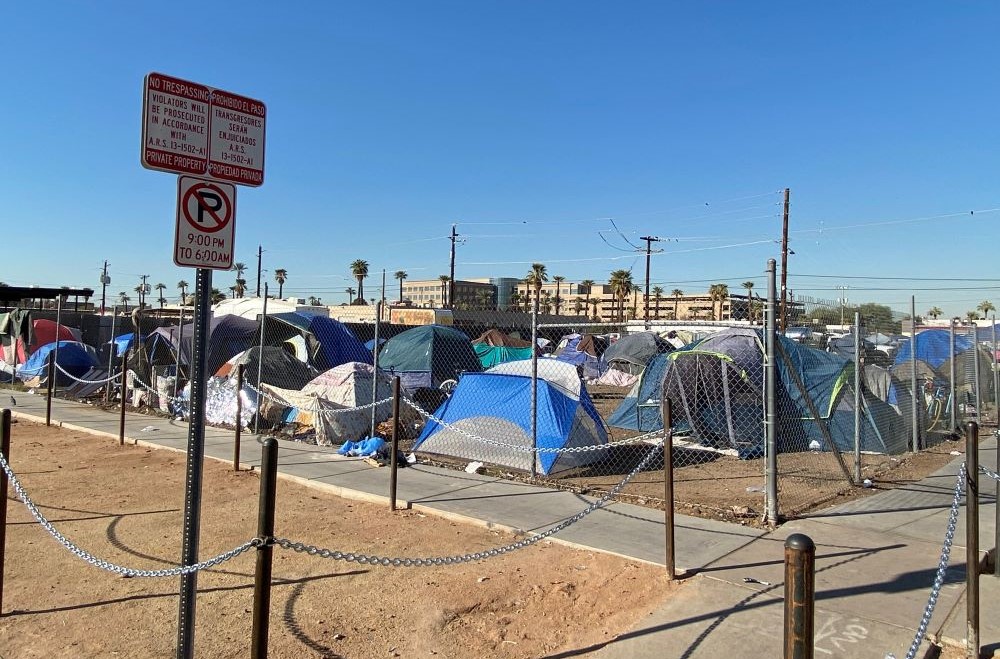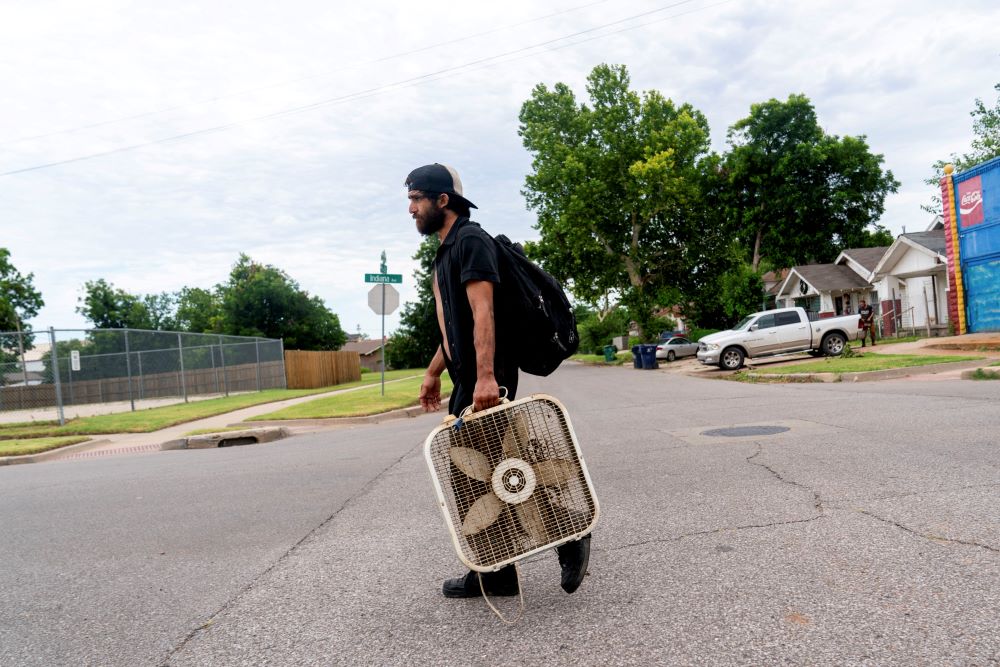
A woman in New York City jogs past blooming cherry trees on April 22, 2021. American Forests' Tree Equity Catalyst Fund is accepting applications from faith communities for grants to plant trees in parts of cities long overlooked and underserved. (CNS/Reuters/Mike Segar)
A century-old conservation group is directing millions of dollars from the nation's largest climate law toward faith communities to plant trees in parts of cities long overlooked and underserved.
American Forests, the country's oldest national conservation organization, has opened a second round of its Tree Equity Catalyst Fund, this one funneling over $12 million from the hundreds of billions in the Inflation Reduction Act to faith-based and community-based environmental justice organizations.
The tree equity fund is part of American Forests' goal to make substantial progress in 100 U.S. cities in increasing tree canopy, specifically in neighborhoods where trees are sparse. The conservation organization estimates more than 500 million new trees are needed in urban settings to reach full tree equity — or ensuring that trees, and their many benefits, are distributed fairly across a city for the betterment of all residents and communities.
A total of $1.5 billion is earmarked for urban forestry under the Inflation Reduction Act — with $360 billion for climate and clean energy initiatives, the country's largest-ever investment on climate change. That allocation represents a major increase in federal tree spending, averaging $150 million annually over a decade compared to $35-40 million a year before the law was signed in August 2022.
American Forests secured $50 million of IRA funds from the U.S. Forest Service to redistribute to local partners, including through this latest grant fund.
A total of $8 million is available for faith groups under the Tree Equity Catalyst Fund through an application process that opened Sept. 30 and runs through Oct. 25. An additional $4.8 million is available for frontline environmental justice organizations. American Forests said it expects to award grants of $100,000 to $1.5 million to 20 to 40 recipients.
Partnering with the faith community for the fund's second round was "a no-brainer," said Lida Aljabar, senior director of the American Forests Catalyst Initiative.
"Faith-based organizations and congregations are trusted community partners and anchors. They're often the first to respond to, say, natural disasters, such as what we're seeing right now in the south in the wake of Hurricane Helene," she told EarthBeat.

Tents stand at a homeless encampment in downtown Phoenix Dec. 18, 2020. Data from American Forests' Tree Equity Score tool found on average lower-income communities have 26% less tree cover and temperatures 6 degrees Fahrenheit hotter than wealthier areas. (OSV News/Reuters/Michelle Conlin)
The American Forests fund aims to empower faith groups to increase tree canopy specifically in parts of cities that have historically suffered from discrimination and disinvestment.
Trees do more than add beauty and color to a neighborhood. They improve quality of life by providing fresh air; removing pollution and planet-warming emissions from the atmosphere; preventing soil erosion and cleaning water; providing animal habitats; and keeping neighborhoods cooler — a benefit especially important in cities where the urban heat island effect traps heat and raises temperatures. In addition, trees can add financial value to homes and neighborhoods.
Redlining and other discriminatory development policies have played a major role in where trees were planted, and where they weren't, Aljabar said.
"We know certainly that there's a direct correlation between the practice of redlining and a lack of trees and tree canopy today. And so that's even decades later we're still grappling with that impact," she told EarthBeat.
Data from American Forests' Tree Equity Score tool — which maps the country's tree cover in cities and urban areas alongside census data on race, income, heat exposure and other social factors — found on average lower-income communities have 26% less tree cover and temperatures 6 degrees Fahrenheit hotter than wealthier areas, while communities of color have 38% less tree cover and 13 F hotter temperatures than white neighborhoods.
"That really has life or death implications," Aljabar said.
A first round of the tree equity fund awarded more than $25 million to 33 municipalities and three community-based organizations. In developing the second round, American Forests conversed with at least a dozen faith organizations, including Catholic Climate Covenant, the Evangelical Environmental Network, Interfaith Partners for the Chesapeake and the National Religious Partnership for the Environment.
Cassandra Carmichael, executive director of National Religious Partnership for the Environment, told EarthBeat there's high interest in tree planting among many faith communities. They make ideal partners, she said, since they're often cornerstones in their neighborhoods and places people turn in moments of crisis.
"Congregations are community hubs," she said.
Her organization, based in Washington, D.C., partners with groups that include the U.S. Conference of Catholic Bishops and plans to apply for an American Forests grant. It has identified potential projects with congregations in North Carolina, Pennsylvania, Ohio and Florida.

James Robinson carries a fan back to his home during an excessive heat warning in Oklahoma City June 26. Several U.S. states have experienced record-breaking hot weather this year. (OSV News/Reuters/Nick Oxford, Reuters)
Creation Justice Ministries, also based in Washington, D.C., is planning to apply for funding as well. It envisions using a portion of the funds to create resources and workshops for its partners and provide subgrants for specific projects.
Avery Davis Lamb, Creation Justice Ministries co-executive director, said faith communities hold capital important for tree planting that other institutions may lack: land capital, social capital through community connections, and moral capital "to build the social and spiritual infrastructure that we need for a climate resilient future."
But barriers exist to tree planting, beginning with costs.
Tree growing incurs more than the going rate of a tree, which depending on the species can run several hundred dollars. Costs include preparation and planning, education and training, and planting and maintaining.
Planting in urban areas adds unique challenges. The environment is harsher and more stressful on trees, with roads and infrastructure presenting hazards to a tree's health. That leads to more planning and maintenance.
"If you've ever planted a tree before, you can't just stick it in the ground and say, 'OK, I'm done.' You have to nurture and care for that tree and maintain that tree for years and years," Carmichael said.
While a project's location, size and focus are major cost variables, individual projects that received $100,000 grants from American Forests in the first round of funding planted 229 to 600 trees. Grant recipients can tap into American Forests' expertise on trees, education and training.
Because the grants are based on federal funds with strict reporting requirements, the money will come as reimbursements, presenting another potential cost barrier for faith organizations or congregations to cover the costs upfront or find other sources.
"I understand why they're doing it. I'm not faulting them for that. But the process is flawed," Carmichael said, "because it makes it very difficult for under-resourced, for non-resourced groups to be able to apply for funding."
Other obstacles for tree planting include a lack of awareness of the importance of trees for public health, a lack of training and resources to properly grow and maintain trees, and the challenge of connecting planting trees to matters of justice and faith.
"It's not immediately obvious why planting an oak tree in the church lawn is a justice issue, right?" Lamb said. "There's a few threads to connect here: threat to air quality, the threat to heat stress, the connection to the fact that redlining maps overlay almost perfectly onto tree canopy maps."
The faith groups say $8 million, while not enough to solve the problem of tree inequity, can make a meaningful difference in local communities.
Grants like those from American Forests can show to other funders that faith organizations have an important role to play in future urban forestry efforts, Carmichael added.
"[To show] that yes, here's the script, here's the proof that what we said can do we can actually do."
Advertisement








